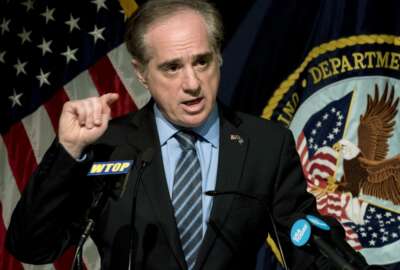The Trump administration says former Veterans Affairs Secretary David Shulkin left his job willingly last week, after a damaging inspector general report and weeks of political infighting within the department.
However, in multiple television interviews over the weekend, Shulkin said he wasn’t asked to and didn’t submit a resignation letter.
This detail — over whether Shulkin was fired or resigned — may seem minute, but it could, once again, revive a series of so far unanswered questions about the Federal Vacancies Reform Act, which Congress last updated in 1998.
The Vacancy Act essentially lets the president appoint a person to serve in an acting capacity if the previous appointee “dies, resigns or is otherwise unable to perform the functions and duties of the office.”
Shulkin’s resignation, if in fact he did voluntarily decide to leave the agency, would let President Donald Trump name his own acting VA secretary. That’s exactly what the president did last Wednesday, when he picked Robert Wilkie, undersecretary for defense for personnel and readiness to serve as acting VA secretary while the permanent nominee, Rear Adm. Ronny Jackson, awaits Senate confirmation.
The president’s decision to bring in a completely new acting secretary bypasses Deputy VA Secretary Tom Bowman, who would typically lead the department in the interim.
But it’s unclear if the Federal Vacancies Reform Act lets the president install his own acting pick to replace a political appointee recently fired from the job.
“One could argue that the president can’t create his or her own vacancy and circumstance where they can appoint somebody temporarily,” said Eric Crusius, an attorney and partner with the law firm Holland and Knight. “But the statutory language is pretty broad.”
At the crux of the uncertainty, is determining what the phrase, “is otherwise unable to perform the functions and duties of the office,” actually means, said Lynne Bernabei, a founding partner with the employment law firm, Bernabei and Kabat.
On the one hand, legal experts say the Vacancies Act doesn’t allow the president to name an acting appointee if the previous executive has been fired, because the statute lists two specific circumstances — death or resignation — where the president can appoint an acting replacement of his choosing. A political appointee who can no longer “perform the functions and duties of the office” could be physically impaired, disabled or injured, Bernabei said in reading the statute.
On the other hand, legal experts can interpret the law’s language in another way.
“If the secretary was fired, that would render him unable to perform the functions and duties of the office,” Crusius said. “If he was imprisoned or sick or something like that, those are other actions that would render him unable to perform the functions or the duties of the office. There’s nothing limiting in the statutory language, and I wouldn’t be surprised if the courts gave the president wide discretion.”
Both Crusius and Bernabei said there are little to no court precedent or case law that attempt to resolve these questions with the Federal Vacancies Reform Act.
But the confusion over Shulkin’s removal could prompt legal challenges from organizations who take issue with any of Wilkie’s official actions as acting VA secretary.
“I wouldn’t be surprised if there’s a legal challenge to any actions that the acting secretary makes on the basis of this language,” Crusius said. “I’d be hard-pressed to believe that a court would find that those actions are unlawful because it does, like from the plain language in the statute, the president does have that broad discretion if they fire the secretary. Certainly, it could be an interesting test case for other potential vacancies that have been mentioned coming up in the future.”
It wouldn’t be the first time ambiguities in the Federal Vacancies Reform Act have been questioned.
Most recently, Leandra English, deputy director of the Consumer Financial Protection Bureau, appealed Trump’s decision to install Office of Management and Budget Director Mick Mulvaney as the agency’s acting leader.
English, who former CFPB Director Richard Cordray quickly named as his deputy director before resigning from the agency in November, says she is the rightful leader of the agency because the Vacancies Act serves as the default authority to allow the president to temporarily name acting agency officials.
However, the Dodd-Frank Act, which created CFPB as an independent federal agency back in 2010, specifically describes how vacancies in the bureau should be filled.
A U.S. District Court judge in Washington had initially denied English’s request and upheld Trump’s decision to install Mulvaney as CFPB director. But English is appealing the court’s decision.
In addition, former acting Office of Personnel Management Director Beth Cobert had her actions as the agency’s leader called into question in 2016, when the OPM inspector general reminded the agency of a 2015 court decision, SW General, Inc. v. National Labor Relations Board (NLRB).
Three years ago, SW General questioned whether one of NLRB’s senior executives became ineligible to serve as acting General Counsel when the President nominated him to be General Counsel.
The court rejected NLRB’s argument, saying the acting officer section “applies to all acting officers and not just those officers who previously served as first assistants.”
The Justice Department sought additional review from the court but the D.C. Circuit denied the petition. The Supreme Court weighed in last summer and upheld the circuit court’s ruling.
Copyright
© 2024 Federal News Network. All rights reserved. This website is not intended for users located within the European Economic Area.
